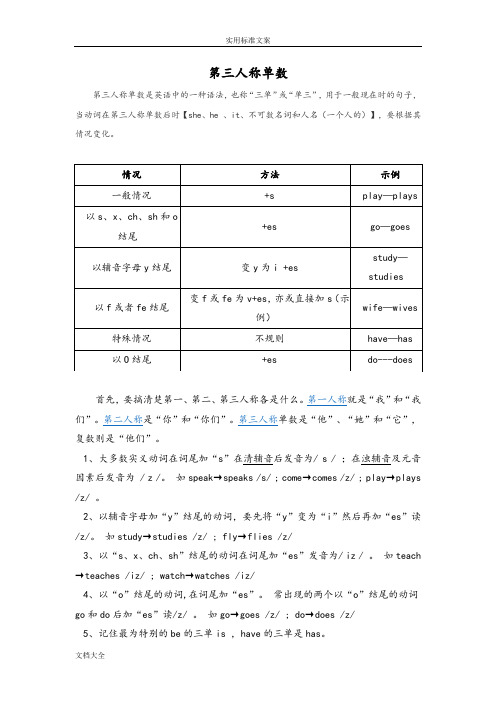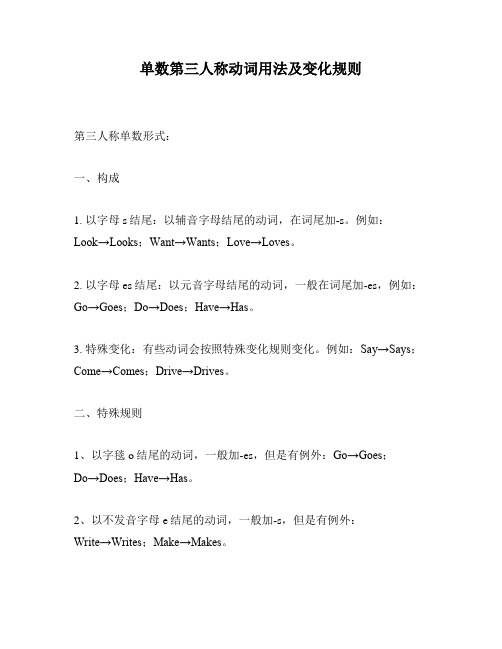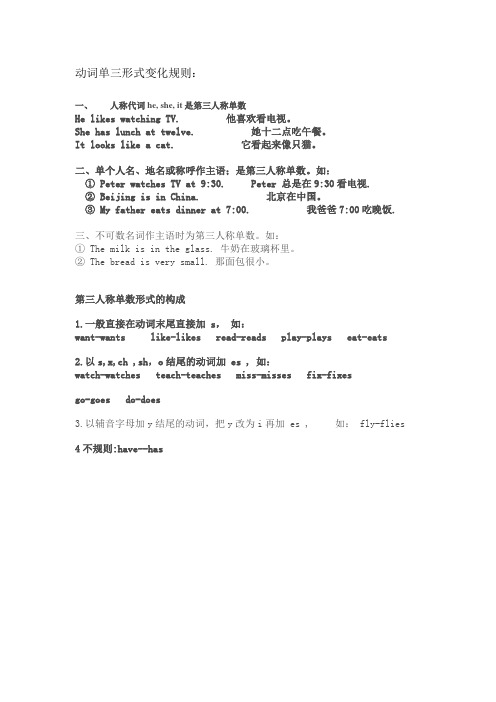第三人称单数
英语人称代词知识点归纳

英语人称代词知识点归纳英语人称代词是用来代替特定人称的词语,分为主格、宾格、属格和反身代词。
以下是英语人称代词的知识点归纳:1. 主格代词(subject pronouns):用于作主语的代词,常用的主格代词有:- 第一人称单数:I(我)- 第二人称单数:you(你)- 第三人称单数:he(他),she(她),it(它)- 第一人称复数:we(我们)- 第二人称复数:you(你们)- 第三人称复数:they(他们,她们,它们)2. 宾格代词(object pronouns):用于作宾语的代词,常用的宾格代词有:- 第一人称单数:me(我)- 第二人称单数:you(你)- 第三人称单数:him(他),her(她),it(它)- 第一人称复数:us(我们)- 第二人称复数:you(你们)- 第三人称复数:them(他们,她们,它们)3. 属格代词(possessive pronouns):用于表示所属关系的代词,常用的属格代词有:- 第一人称单数:my(我的)- 第二人称单数:your(你的)- 第三人称单数:his(他的),her(她的),its(它的)- 第一人称复数:our(我们的)- 第二人称复数:your(你们的)- 第三人称复数:their(他们的,她们的,它们的)4. 反身代词(reflexive pronouns):表示动作的主体和受动作影响的是同一个人或事物,常用的反身代词有:- 第一人称单数:myself(我自己)- 第二人称单数:yourself(你自己)- 第三人称单数:himself(他自己),herself(她自己),itself(它自己)- 第一人称复数:ourselves(我们自己)- 第二人称复数:yourselves(你们自己)- 第三人称复数:themselves(他们自己,她们自己,它们自己)以上是英语人称代词的基本知识点归纳。
根据语境和句子结构的不同,人称代词的使用也会有一些变化。
英语“三单形式”详解

第三人称单数[注意]a、下面两个动词变三单时,原词的元音部分的发音发生了较大的变化,要记忆。
如do/du:/ →does/dʌz/ ; say/sei/ → says /sez/ 。
b、以不发音字母“e”结尾的开音节词,如果尾音是[s][z]时加“s”后字母“e”发音与所加“s”一起读做[iz]。
如: close→closes [iz]。
在中文中第三人称单数的三个“他”写法不一样,读音却相同。
但在英语中,三个“他”既有不同的读音,也有不同的写法,分别是he, she, it。
在第三人称后不能使用动词的原形,而要在相应的动词后加s或es。
简单地讲,一个人就是单数,多于一个人就是复数。
在咱们汉语里,第三人称复数也就是常说的“他们”或者“她们”,英语中就是they.而“第三人称单数”就是指的“他”或者“她”,在英语中,相对应的就是he 或者she句子举例:第三人称单数: He is a student. (他是学生)第三人称复数: They are students.(他们是学生)以上只是一种帮助你理解的简单回答,第三人称还包括一些其他的方面,比如“it”等,这里就不多说了,希望你在学习中多多体会。
在一般现在时中,当主语是第三人称单数时,谓语动词要用第三人称单数形式,即常在动词原形后加-s或-es。
下面归纳一下第三人称单数的用法:一、人称代词he, she, it是第三人称单数。
如:He likes watching TV. 他喜欢看电视。
She has lunch at twelve. 她十二点吃午餐。
It looks like a cat. 它看起来像只猫。
二、单个人名、地名或称呼作主语;是第三人称单数。
如:①Han Mei looks like her mother. 韩梅看起来像她的母亲。
②Beijing is in China. 北京在中国。
③Uncle Wang often makes cakes. 王叔叔经常做蛋糕。
be和do及can与人称的用法

一、第一人称单数:I我。
第二人称:you你。
第三人称单数:he他、she她、it它。
人称复数:we我们、you你们、they他们。
二、be动词用法(am、is、are)
1.第一人称单数I只跟am。
2.第二人称you和复数we、you、they跟are。
3.其余的第三人称单数跟is。
三、do的用法:
第一人称I、第二人称you、复数we、you、they用do
第三人称单数:他、她、它用does
四、have的用法:
第一人称I、第二人称you、复数we、you、they用have
第三人称单数:他、她、它用has
五、疑问句变换:
1. 有be动词的把be动词提到前面
That is your brother. Is that your brother?
You are a student. Are you a student?
2. 有can的提到前面(只要一个句子有can,相关的句子都有can)
He can swim. Can he swim? Yes,he can. No.He can’t.
3. 没有be动词和can的,前面加do(第一、二人称或复数)或does(第三人称单数)
He studys English. Does he study English?
You play basketball. Do you play basketball?。
(完整版)动词单数第三人称练习题

第三人称单数的变化规则一、哪些主语是第三人称单数?(一)人称代词he, she, it是第三人称单数。
如: 1. He likes cars. 他喜欢车。
2. She goes to school at seven. 她七点去上学。
3. It has a good name. 它有一个好名字。
(二)单个人名、地名或亲友的称呼等作主语,是第三人称单数。
如: 1. Miss Wang(人名) waters the flowers once a day.王老师一天给花浇水一次。
2. Beijing is in China. 北京在中国。
3. Aunt Mary(亲友) usually makes cakes.玛丽阿姨经常做蛋糕。
(三)单数可数名词或“this/that/the+单数可数名词”作主语时,是第三人称单数。
如:1. A horse is a useful animal. 马是有用的动物。
2. This book is yours. 这本书是你的。
3. That car is red. 那辆小车是红色的。
4. The cat is cute. 这只猫是可爱的。
(四)不定代词someone, somebody, nobody, everything, something, 作主语时,是第三人称单数。
如:1. Everyone is here. 每个人都到齐了。
2. Everything is OK. 万事俱备。
(五)不可数名词作主语时,看作第三人称单数。
如:1. The milk is in the glass. 牛奶在玻璃杯里。
(六)当数字或字母作主语时,看作第三人称单数。
如:1.“6”is a lucky number. “6”是个吉利的数字。
2. “I”is a letter. “I”是个字母。
二、第三人称单数形式的构成(一)一般直接在词尾加 -s如:1. work-works live-lives make-makes(二) 以o, s, x, ch, sh等结尾的单词加 -es如: go-goes do-does miss-misses fix-fixes finish-finishes teach-teaches (三)以辅音字母加y结尾的单词,变y为i, 再加 -es如: fly-flies carry-carries(四) 特殊变形的有: have-has一般疑问句和特殊疑问句一、一般疑问句be动词(am, is are)肯定:Yes, 主语+引导词引导词can/will/should等情态动词答语do/does/did助动词否定:No, 主语+引导词+not二、特殊疑问句(即由特殊疑问词引导的疑问句)特殊疑问词有:when, where, who, what, whose, why, howbe动词(am, is are)特殊疑问词+ can/will/should等情态动词+ 主语+ 谓语+ 其他do/does/did助动词改写否定句型be动词+ notcan/will/should等情态动词+ not主语+ do/does/did + not + 谓语动词感叹句的表述What + a/an + 形容词+ 名词例:What an interesting film!How + 形容词+ 主语+ 谓语例:How interesting the film is!补充知识点动词原形如:buy(买)1、be going to + 地点如:the park打算... 时间如:on Monday2、want to + 动词原形表示“想要...”3、在......转弯用介词“at”, 如turn left at.../turn right at4、like + V-ing, 如:He likes playing basketball.5、by + 交通工具,表示交通方式。
单数第三人称动词用法及变化规则

单数第三人称动词用法及变化规则第三人称单数形式:一、构成1. 以字母s结尾:以辅音字母结尾的动词,在词尾加-s。
例如:Look→Looks;Want→Wants;Love→Loves。
2. 以字母es结尾:以元音字母结尾的动词,一般在词尾加-es,例如:Go→Goes;Do→Does;Have→Has。
3. 特殊变化:有些动词会按照特殊变化规则变化。
例如:Say→Says;Come→Comes;Drive→Drives。
二、特殊规则1、以字毯o结尾的动词,一般加-es,但是有例外:Go→Goes;Do→Does;Have→Has。
2、以不发音字母e结尾的动词,一般加-s,但是有例外:Write→Writes;Make→Makes。
3、以辅音字母加y结尾的动词,去y加-ies:Attend→Attends;Carry→Carries。
4、以-ch、-sh、-z、-x结尾的动词,加-es:Watch→Watches;Rush→rushes;Fizz→Fizzes;Fix→Fixes。
5、有些双写的字母,加-es,例如:Dr ess→Dresses;Miss→Misses;Wish→Wishes;Buzz→Buzzes。
6、有的动词的变化太多了,只能熟记:Be→Is;Have→Has;Know→Knows。
7、有的动词,复杂到没有规律可言,只能记忆:Cut→Cuts;Put→Puts;Shut→Shuts。
三、谓-补结构在句子中,一般第三人称单数形式,后面跟be动词和介词短语形成谓-补结构:1. 用is结构:He is at home.2. 用are结构:They are in the room.3. 用am结构:She am in the study.4. 用has/have结构:He has a nice watch.以上是关于第三人称单数构成及变化规则的介绍,大家要好好记忆,日积月累,运用起来就很自然了。
单三形式

动词单三形式变化规则:
一、人称代词he, she, it是第三人称单数
He likes watching TV. 他喜欢看电视。
She has lunch at twelve. 她十二点吃午餐。
It looks like a cat. 它看起来像只猫。
二、单个人名、地名或称呼作主语;是第三人称单数。
如:
① Peter watches TV at 9:30. Peter 总是在9:30看电视.
② Beijing is in China.北京在中国。
③ My father eats dinner at 7:00. 我爸爸7:00吃晚饭.
三、不可数名词作主语时为第三人称单数。
如:
① The milk is in the glass. 牛奶在玻璃杯里。
② The bread is very small. 那面包很小。
第三人称单数形式的构成
1.一般直接在动词末尾直接加s,如:
want-wants like-likes read-reads play-plays eat-eats
2.以s,x,ch ,sh,o结尾的动词加es ,如:
watch-watches teach-teaches miss-misses fix-fixes
go-goes do-does
3.以辅音字母加y结尾的动词,把y改为i再加 es , 如: fly-flies 4不规则:have--has。
动词三单规律

动词三单规律动词的三单规律是英语语法中的一个重要规则,它指的是在句子中,当主语为第三人称单数时,动词需做相应的变化。
下面将详细介绍这一规律,并提供一些例句来帮助理解。
一、动词三单规律概述在英语中,当主语为第三人称单数时,动词的形式会发生变化。
一般情况下,动词在第三人称单数时在词尾加上“-s”或“-es”。
但也有一些特殊情况需要注意,例如以“-s”、“-sh”、“-ch”或“-x”结尾的动词,需要在词尾加上“-es”。
二、动词三单规律示例1. 一般情况下,动词在第三人称单数时加上“-s”。
- He writes a novel every year.(他每年写一本小说。
)- She sings beautifully.(她唱得很好听。
)- The cat sleeps on the sofa.(猫在沙发上睡觉。
)2. 以“-s”、“-sh”、“-ch”或“-x”结尾的动词,在第三人称单数时加上“-es”。
- He kisses his wife goodbye every morning.(他每天早上吻别妻子。
)- She washes her clothes on weekends.(她周末洗衣服。
)- The fox catches the rabbit.(狐狸捉住了兔子。
)3. 以辅音字母+y结尾的动词,在第三人称单数时变为“-ies”。
- He studies English every day.(他每天学习英语。
)- She flies to London next week.(她下周飞往伦敦。
)4. 以元音字母+y结尾的动词,在第三人称单数时加上“-s”。
- He plays basketball with his friends.(他和朋友们一起打篮球。
)- She enjoys reading books.(她喜欢读书。
)5. 一些不规则动词在第三人称单数时发生特殊变化。
- He has a car.(他有一辆车。
实义动词

实义动词一、定义:指某个具体的静态或动态的行为动词。
二、形式:实义动词的基本形式——原形、第三人称单数形式、过去式、现在分词和过去分词。
不同的形式构成了动词的不同时态概念。
(一)第三人称单数形式:是指当主语是第三人称单数,时态是一般现在时的动词形式。
特殊构成:实义动词have的单数第三人称形式是:has实义动词单数第三人称—动词短语形式:1)-s gets up comes back comes from looks after makes noodleseats/ has lunch drinks coffee2)-es watches TV brushes teeth goes to bed goes to schooldoes homework3)-ies flies kites hurries up studies hard例句:肯定陈述句:1)He gets up at six o’clock.2)Danny studies English, Chinese, Math, Science and Art at school.3)Mike sometimes goes to the park with his sister.4)At eight at night, she watches TV with her parents.否定陈述句:1)He doesn’t get up at six o’clock.2)Danny doesn’t study English, Chinese, Math, Science and Art at school.3)Mike doesn’t go to the park with his sister.4)At eight at night, she doesn’t watch TV with her parents.一般疑问句:1)Does he get up at si x o’clock?2)Does Danny study English, Chinese, Math, Science and Art at school?3)Does Mike sometimes go to the park with his sister?4)At eight at night, does she watch TV with her parents?特殊疑问句(试一试):1)He gets up at six o’clock.2)Danny studies English, Chinese, Math, Science and Art at school.3)Mike sometimes goes to the park with his sister.4)At eight at night, she watches TV with her parents.(二)过去式(三)现在分词(四)过去分词。
- 1、下载文档前请自行甄别文档内容的完整性,平台不提供额外的编辑、内容补充、找答案等附加服务。
- 2、"仅部分预览"的文档,不可在线预览部分如存在完整性等问题,可反馈申请退款(可完整预览的文档不适用该条件!)。
- 3、如文档侵犯您的权益,请联系客服反馈,我们会尽快为您处理(人工客服工作时间:9:00-18:30)。
He goes to work by car.
My mom is an teacher.
My mom is a teacher
She teaches in our school.
Sometimes my mother go to work by car, sometimes by bike.
My friend has three big bags.The bags are too heavy. She can’t get on the bus.Please help her take away the bags.
我带的东西太多了,走不到车站。 我带的东西太多了,走不到车站。 你们能帮我拿掉一些吗? 你们能帮我拿掉一些吗?
栏中选出A 栏的答句。 从B 栏中选出 栏的答句。
( ( ( ( (
B )1.Does your friend live in Beijing? D )2.What is your hobby? E )3.Where does the cloud come from? A )4.What does your mother do? C )5.Who’s she?
Sometimes my mother goes to work by car,
She hobby is singing. I am a student. Her hobby is singing. I like colecting stamp , diveing and painting. I love my family. I like collecting stamps , diving and painting.
I comes from Austalia .
I come from Australia.
I lives with my parents.
I live with my parents.
But we are in Chinese now.
But we are in China now.
My parents works there .
What does he like doing?
2.A:__________________________ What’s his hobby? B:He likes painting.
What do you do?/What are 3.A:__________________________ you?
B:I am a teacher.
选出正确答案: 选出正确答案:
( C )1. Does Mike like painting?
A.Yes, I do. B.Yes, he do. C.Yes, he does.
( B )2.I ___ have a TV. A.am not B. don’t C.doesn’t ( C )3.Ann likes_____kites. A.make B.makes C.making ( A )4.My father ___books every day. A.reads B.looks C.watches
What does Amy’s grandma do? She is a farmer.
Does Amy’s grandpa clean street once a week?
No, he doesn’t. How does Amy’s uncle go to work? He goes to work by car. Is Amy’s aunt a salesman? No, she is a saleswoman. Who’s Amy’s cousin? She is Lily./Amy’s cousin is Lily.
I am Amy (A)
I come from Australia . I live with my parents.But we are in China now. My parents work here . My dad is a doctor. He works in Donghua Hospital. He likes reading. He goes to work by car. My mom is a teacher. She teaches in our school.Sometimes my mother goes to work by car,sometimes by bike. Her hobby is singing. I am a student.I like collecting stamps , diving and painting. I love my family.
200分 分
100分 分
500分 分
400分 分
300分 分
600分 分
说出下列动词的第三人称单数形式: 说出下列动词的第三人称单数形式: 1. say( says ) 3. work( works ) 5.enjoy(enjoys ) 7.do( does ) 9.have ( has ) 11.feel ( feels ) 2.go ( goes ) 4.like ( likes ) 6.study (studies ) 8.teach ( teaches ) e( comes ) 12.play(plays )
根据所改正的短文,来回答下列问题: 根据所改正的短文,来回答下列问题: 1.Where does Amy come from? She comes from Australia./She is from Australia. 2.What does her father do? Her father is a doctor. 3.How does her father go to work? He goes to work by car. 4.What is her mother? Her mother is a teacher.
4. helps, he, the, use, well, money, bank, their.
He helps the bank use their money well.
用所给动词的适当形式填空。
1. I go to school by bike. But goes my brother______(go) on foot. drawing 2.Do you like_______(draw) pictures? go 3.Let’s _____(go ) together. lives 4.Mr Green_____(live) in Australia.
1.I can go to Donghua School bus by______(u,s,b). traffic 2.I must know the _______(a,f,t,f,r,c,i) rules. should 3. I _______(h,d,l,o,s,u) get off at the hospital. 4.I ______(e,i,l,v) in Dongguan. live
5.What does Amy like doing? She likes collecting stamps, diving and painting. 6.What is Amy ? She is a student. 7.What is Amy’s mother’s hobby? She likes singing. Her hobby is singing.
Amy’s aunt(B) ( ) Amy’s aunt is in Australia. She writes an Email to Amy: Dear Amy, China must be fun. First ,tell you something about our family. Your grandma still works on a farm. Your grandpa cleans street every day. Your uncle drives a car to work. He designs many new buidlings in our city. Your cousin Lily goes to school on foot every day.I changed my work, I sell shoes in a big supermarket. I want to know your life in China. Please write to me soon. Your aunt, Linda.
My parents work here.
My dad is a doctor. He work in Donghua Hospital.
He works in Donghua Hospital.
He like reading.
He likes reading
He go to walk by car.
说出下列动词的( 形式) 说出下列动词的(ing 形式)现在分词 形式 1. play( playing ) 2.dive( diving ) 3.ride ( riding ) 4.sing( singing ) 5.make( making) 6.teach( teaching ) 7.drive( driving ) 8.swim( swimming) 9.run ( running ) 10.write( writing ) 11.live( living ) 12.draw( drawing )
请把第三人称单数的单词读出来
1. I 2. he 3. my 4. Sarah
5.my mother 8. you 11.she
14. them
6. they 7. we
